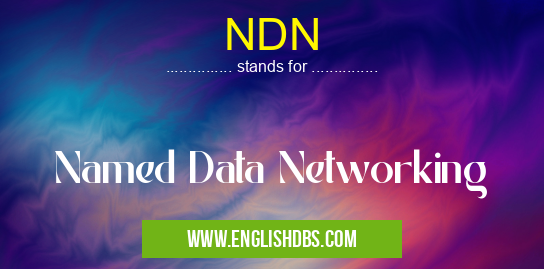What does NDN mean in NETWORKING
Named Data Networking (NDN) is a novel networking paradigm that focuses on data retrieval based on its name rather than on the location of the server hosting it. NDN is a content-centric networking (CCN) architecture, meaning that it treats data as the primary entity and provides security and reliability mechanisms tailored specifically for data dissemination.

NDN meaning in Networking in Computing
NDN mostly used in an acronym Networking in Category Computing that means Named Data Networking
Shorthand: NDN,
Full Form: Named Data Networking
For more information of "Named Data Networking", see the section below.
» Computing » Networking
Meaning of NDN in COMPUTING
NDN stands for Named Data Networking in the context of computing. It represents a shift from the traditional host-centric networking model, where data is retrieved by specifying the host's address, to a data-centric model, where data is retrieved by its unique name. This approach allows for more efficient and secure data retrieval, making it suitable for various applications, including video streaming, content distribution, and sensor networks.
Key Characteristics of NDN
- Data-centric: NDN treats data as the primary entity, focusing on its retrieval based on its name.
- Unique naming: Each piece of data has a unique name, enabling efficient and secure data retrieval.
- Hierarchical structure: Data names are organized in a hierarchical structure, resembling a file system.
- Security: NDN incorporates security mechanisms to protect data integrity and confidentiality during transmission.
- Reliability: The networking architecture provides mechanisms for reliable data delivery, ensuring that data reaches its intended recipients.
Applications of NDN
NDN has potential applications in various domains, including:
- Video streaming
- Content distribution
- Sensor networks
- Internet of Things (IoT)
- Cloud computing
Essential Questions and Answers on Named Data Networking in "COMPUTING»NETWORKING"
What is Named Data Networking (NDN)?
NDN is a future-oriented networking paradigm that focuses on content, rather than hosts or locations. It allows users to name and request specific data, regardless of where it is stored.
How does NDN differ from traditional networking protocols?
Traditional protocols, such as TCP/IP, are host-centric, meaning they focus on connecting devices and establishing communication channels. NDN, on the other hand, is data-centric, prioritizing the delivery of specific content to interested consumers.
What are the benefits of NDN?
NDN offers several benefits, including:
- Flexibility: It can adapt to diverse network conditions and efficiently handle content distribution in dynamic environments.
- Security: NDN's built-in security features protect data from unauthorized access and manipulation.
- Scalability: Its hierarchical data structure allows for efficient content discovery and distribution, even in large networks.
What are the potential use cases for NDN?
NDN has numerous potential use cases, such as:
- Content delivery networks (CDNs): Optimizing video streaming and file distribution.
- Internet of Things (IoT): Enabling secure and efficient communication among IoT devices.
- Mobile networks: Enhancing content accessibility and reducing latency in mobile environments.
How is NDN being implemented and adopted?
Research and development efforts are ongoing to advance NDN technology. Several experimental deployments and pilot projects are being conducted to test its capabilities and explore real-world applications.
Final Words: Named Data Networking (NDN) is a revolutionary networking approach that offers a paradigm shift from location-based to data-centric networking. By focusing on data's name, NDN enables more efficient, secure, and reliable data retrieval. As the demand for data-intensive applications continues to grow, NDN is poised to play a significant role in the future of networking.
NDN also stands for: |
|
| All stands for NDN |
